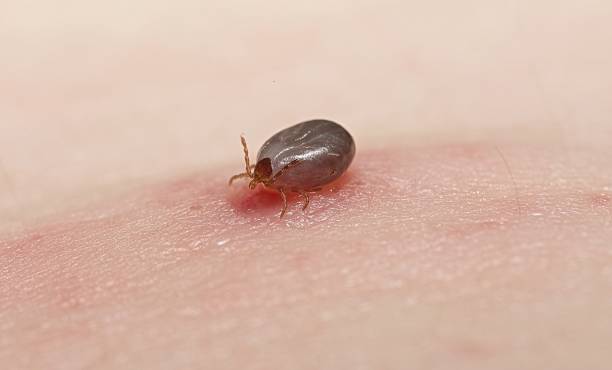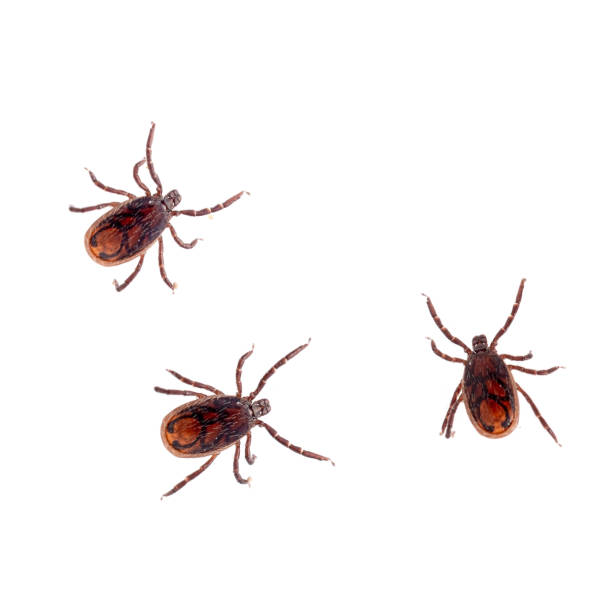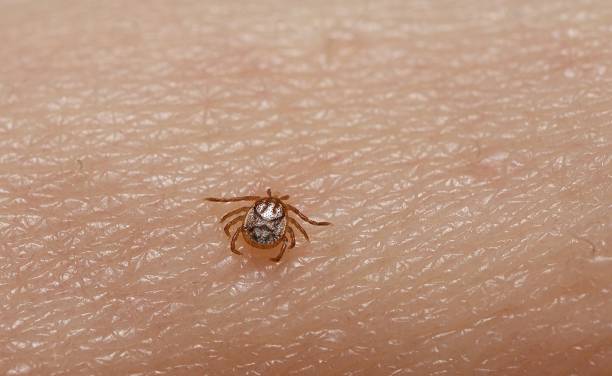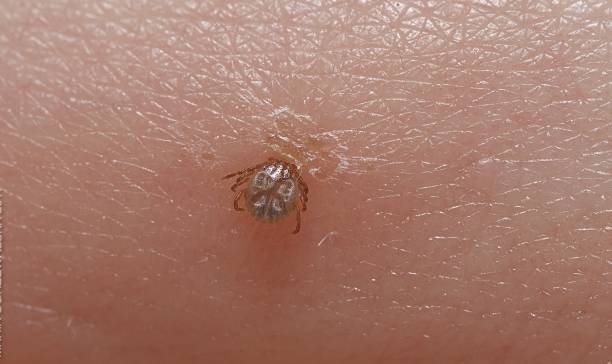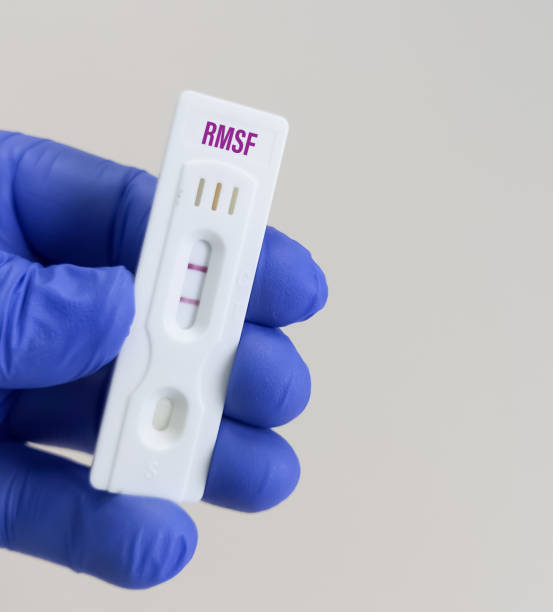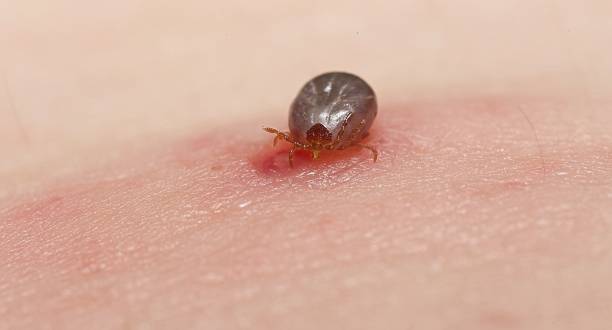
Rocky Mountain Spotted Fever Pictures, Images and Stock Photos
Browse 50+ rocky mountain spotted fever stock photos and images available, or search for rickettsia or scarlet fever to find more great stock photos and pictures.

Immature tick (nymph) of Amblyomma sculptum tick full of blood after parasitizing human
Immature tick (nymph) of Amblyomma sculptum tick full of blood after parasitizing human
Infected mite on wrinkled human finger detail. Epidermis. Bug, vermin. Ixodidae. Tick-borne diseases transmitter. Canine babesiosis, ehrlichiosis, hepatozoonosis. Veterinary
The brown dog tick, Rhipicephalus sanguineus isolated on white background. Canine risk for many conditions including babesiosis, ehrlichiosis, rickettsiosis, and hepatozoonosis. In humans: Rocky Mountain spotted fever, Rickettsia rickettsii, and Mediterranean spotted fever, R. conorii.
The brown dog tick, Rhipicephalus sanguineus isolated on white background. Canine risk for many conditions including babesiosis, ehrlichiosis, rickettsiosis, and hepatozoonosis. In humans: Rocky Mountain spotted fever, Rickettsia rickettsii, and Mediterranean spotted fever, R. conorii.
Dangerous parasite on natural background. Top view. Infection carrier detail. Ixodidae. Lurking bug, vermin. Tick-borne diseases transmitter. Mediterranean spotted fever. Canine babesiosis, ehrlichiosis, hepatozoonosis. Veterinary
Immature tick (nymph) of Amblyomma sculptum tick parasitizing human
adult male ixodid tick - a blood-sucking parasite - a carrier of dangerous diseases crawls on clothes, selective focus
Attention tick, here threatens danger
Exotic tropical fish different colors underwater ocean species aquatic nature flat isolated vector illustration. Decorative wildlife cartoon fauna aquarium water marine life.
Immature tick (nymph) of Amblyomma sculptum tick parasitizing human
Immature tick (nymph) of Amblyomma sculptum tick parasitizing human
Exotic tropical fish different colors underwater ocean species aquatic nature flat isolated vector illustration. Decorative wildlife cartoon fauna aquarium water marine life.
Tick walking inside a dog's ear seen from above. Danger by disease-transmitting parasite. Concept of zoonosis, pet infestation and external parasites.
Tick full of blood next to a one cent euro coin for size comparison. Filled tick after feeding on the blood of a dog. Domestic animal infection, zoonosis, parasites and veterinary concept.
Exotic tropical fish different colors underwater ocean species aquatic nature flat isolated vector illustration. Decorative wildlife cartoon fauna aquarium water marine life.
Tick on the inside of a dog's ear. Detail of a tick between the hairs with the pink skin in the background. Concept of parasites, pets and veterinary.
Exotic tropical fish different colors underwater ocean species aquatic nature flat isolated vector illustration. Decorative wildlife cartoon fauna aquarium water marine life.
A beautiful and expansive hillside covered in numerous trees can be found in the stunning Masca Valley of Tenerife.
Rocky mountain spotted fever line icon. Symptom of tick-borne rickettsiosis symbol. Rash on ankle vector sign. Editable stroke.
beautiful seascape view with rocky mountains and blue sky at Pileh Lagoon, Phi Phi Island, Krabi southern Thailand, copy space
Scenery of a rocky mountain with a bright blue sky background, Pileh Lagoon, Phi Phi Island, Krabi southern Thailand, copy space
beautiful seascape view with rocky mountains and blue sky at Pileh Lagoon, Phi Phi Island, Krabi southern Thailand, copy space
Banff Alberta Canada, Rocky Mountains, River, Tree, Sky, People Standing, Sitting Down, Eating And Drinking, Talking To One Another During Autumn Season Scenery. Photographed With Nikon D7200 DSLR Camera
beautiful seascape view with rocky mountains and blue sky at Maya Bay, Phi Phi Island, Krabi southern Thailand, Filming locations for the movie The Beach in 2000
Exotic tropical fish different colors underwater ocean species aquatic nature flat isolated vector illustration. Decorative wildlife cartoon fauna aquarium water marine life.
Ticks, tiny arachnids found in natural environments, can pose potential risks to human health. It is crucial to be aware of the following considerations to protect yourself and your loved ones: Tick-Borne Diseases: Ticks are known to transmit diseases such as Lyme disease, Rocky Mountain spotted fever, and others. These diseases can have serious health consequences if left untreated. Prevention Measures: Use insect repellents containing DEET or picaridin on exposed skin and clothing. Wear long-sleeved shirts, long pants, and closed-toe shoes when in tick-prone areas. Conduct thorough tick checks on yourself, family members, and pets after spending time outdoors. Consider treating clothing and gear with permethrin, an insecticide specifically designed for repelling ticks. Prompt Removal: If you find a tick attached to your skin, remove it carefully using fine-tipped tweezers. Grasp the tick close to the skin's surface and pull upward with steady, even pressure. Clean the bite area with soap and water. Seek Medical Attention: Monitor the bite site for any unusual symptoms or signs of infection, such as a rash, fever, or flu-like symptoms. If you experience any concerning symptoms, consult a healthcare professional promptly. By staying vigilant and following these precautions, you can minimize the risks associated with tick bites and enjoy outdoor activities with greater peace of mind. Remember: Awareness and proactive measures are key to protecting yourself against tick-borne diseases.
Exotic tropical fish different colors underwater ocean species aquatic nature flat isolated vector illustration. Decorative wildlife cartoon fauna aquarium water marine life.
Exotic tropical fish different colors underwater ocean species aquatic nature flat isolated vector illustration. Decorative wildlife cartoon fauna aquarium water marine life.
Scenery of a rocky mountain with a bright blue sky background, Pileh Lagoon, Phi Phi Island, Krabi southern Thailand, copy space
Immature tick (nymph) of Amblyomma sculptum tick parasitizing human
Holding a rapid test device for Rocky Mountain Spotted Fever(RMSF) test, show positive result.
3D illustration of a detailed tick: SEM Electron Microscope Replica in orange colour
3D illustration of a detailed flea: SEM Electron Microscope Replica in orange colour
Exotic tropical fish different colors underwater ocean species aquatic nature flat isolated vector illustration. Decorative wildlife cartoon fauna aquarium water marine life.
American dog tick Dermacentor variabilis on white background
Bio-hazard symbol with navigation location map pin icon vector illustration
Exotic tropical fish different colors underwater ocean species aquatic nature flat isolated vector illustration. Decorative wildlife cartoon fauna aquarium water marine life.
